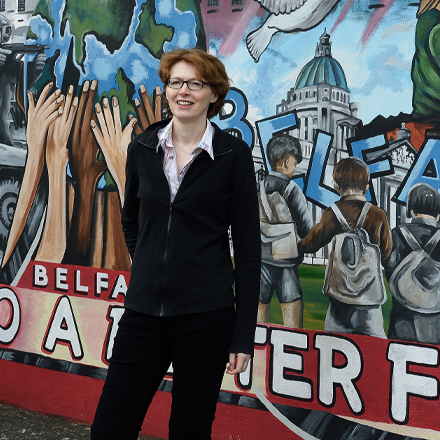
Rosemary Jenkinson was born in Belfast and is an award-winning playwright and short story writer. She won the 2001 Black Hill Magazine Short Story Competition, third prize in the Brian Moore Short Story Awards and was shortlisted for the 2002 Hennessy Award for New Writing. Her first collection of short stories, Contemporary Problems Nos. 53 & 54, was published in 2004 by Lapwing Press. She’s won many General Artist’s Awards from the ACNI and was awarded Artist-in-Residence at the Lyric Theatre in Belfast. Her sixth short story collection, Love in the Time of Chaos, was published by Arlen House in 2023 and is currently shortlisted for the Edge Hill Short Story Prize. This is Rosemary’s third time being shortlisted for the Edge Hill Prize.
What do you love about the short story?
I love the short story because it’s short. To me, writing a story with a low word count feels as freeing as travelling to an exotic country with just a t-shirt and a pair of pants in my bag. While I can write a short story within two or three days, it does, however, take a long time to refine it. It was Mark Twain who said, ‘I didn’t have time to write a short letter, so I wrote a long one instead.’ Though I’d probably reframe it as ‘I didn’t have time to write a short story, so I wrote a novel instead.’
Is there a particular story in your collection you are proud of and why?
Never ask a mother which of her children she loves best! No, I’m particularly proud of Khaki Beach, not because it’s artistically better than the others, but because it was inspired by a trip to Ukraine in June 2022. I value it because I had to overcome my fear of going to a warzone.
Do you have any writing habits and how do they help?
My biggest writing habit is to get my story down on the page as fast as possible before the idea dissipates. Bohumil Hrabal once said, ‘You have to write as if you were f**king in a passageway,’ and I totally concur with him. My other writing habit is to use profane quotes. One of my favourite Bukowski quotes is his advice to young writers: ‘Drink, f**k and smoke plenty of cigarettes.’ It applies equally to older writers – especially the middle part.
Were there any surprising or unexpected moments that arose while you wrote your collection?
If you’re not surprised by your writing, how can you ever expect to surprise the reader. I didn’t anticipate the angry wife turning up in Love in the Time of Lockdown, nor did I know if Kerry would kill Winkie in Here Comes the Day. I think that some people become writers because they feel quite powerless in real life and want to make their characters dance for them, but the page is no place for control freakery. It’s wonderful when characters take control of the narrative. As William Faulkner said of his stories, ‘It begins with a character, usually, and once he stands up on his feet and begins to move, all I can do is trot along behind him.’
Are there any characters in your collection you would like to spend time with and why?
To be honest, I’ve lavished far too much time on these characters already. They were born in my mind and share some of my own experiences and observations, so it would be like spending a narcissistic night with myself. But I’d still really like to visit Ukraine with the aid workers or fly with the environmentalists to India where I’d enjoy an intimate evening with Vikas.
What writers or stories have influenced you and why?
I love it when a contemporary short story inspires me with its themes. My story Erin was prompted by an excellent story by Éilís Ní Dhuibhneabouta woman who discovers she has a breast lump. As for writers, I’m heavily influenced by Bruno Schulz. Schulz noted that ‘a drawing sets narrower limits by its material than prose does’ and he managed to prove that the short story is more visual, stylish and powerful than any other art form. My story The Particularities is founded on his lyrical, surreal style. Another writer I adore is Hubert Selby. Like Selby, I relish writing violence and my final short story Storm on the Border ends in brutality. Seán Ó Faoláinsaid he liked to see ‘punch and poetry’ in a story, but I don’t think he meant a literal punch!
